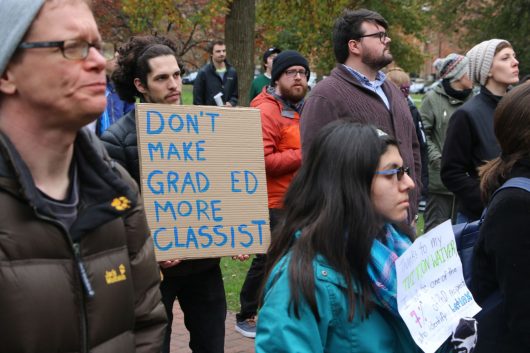
Maxwell Holden, a first-year graduate student in the Master’s of fine arts program, holds a sign while he protests the Congressional Republicans’ tax bill Monday. “Don’t Make Grad Ed More Classist,” it reads. Credit: Kevin Stankiewicz | Editor-in-Chief
A tax provision that would bump those receiving graduate school stipends and tuition waivers to higher tax brackets, resulting in students having geater taxable incomes, will not be in the Republican’s final version of the tax bill, Bloomberg News reported Wednesday.
The previous provision included in the House version of the “Tax Cuts and Jobs Act” counted stipends or covered tuition graduate students and doctoral candidates often receive from universities for teaching or conducting research during their tenure as taxable income.
Currently, the government only taxes a student’s stipend, not waived tuition.
After the differences were ironed out in conference committee, the final version of the tax bill will be sent to the House and Senate, where the two chambers will vote on it. Republicans hope to have a bill for President Donald Trump to sign by the end of the year.
Graduate students typically receive stipends to cover the cost of tuition; in one Ohio State student’s case she receives a $17,000 stipend for teaching and living, in addition to a tuition waiver around $33,000. If the bill passed, she said her “income” of about $50,000 would be taxed at about 20 percent.
For in-state students, graduate and professional school costs $31,093 each year at Ohio State; for out-of-state students, it costs $52,561.
The average salary for a graduate research assistant is less than $30,000, according Vox and nearly 90 percent of graduate students reported earning less than $50,000, according to the Chronicle of Higher Education.
Ohio State is home to 10,708 master’s students and 3,219 postbaccalaureate professional students across all campuses. More than 4,300 students receive nontaxable tuition waivers currently, according to a letter released by University President Michael Drake in response to the House bill’s provisions.
Drake has gone on-record to voice his opposition for the bill. In his public letter, he said the provisions would have “negative consequences for students, families and Ohioans who rely on research universities for undergraduate and graduate education …”
He added the tax increase would make it difficult for universities to recruit students, “thus hindering our research and innovation mission.”
With the provision no longer in place, graduate students at Ohio State can breathe a sigh of relief — then get back to taking and grading final exams.


